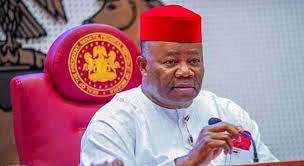- Wants public hearing on budgets
By Henry Oduah
Reporter
Deputy Senate President, Ike Ekweremadu, has solicited more support from the International Monetary Fund (IMF) to solve Nigeria’s economic problems.
He spoke while receiving on behalf of Senate President, BukolaSaraki, a delegation of IMF African Department which visited him in Abuja.
Ekweremadu thanked the IMF for its support for Nigeria but said the country needs more collaboration from it at this time of recession.
“The IMF has shown keen interest in the development of Nigeria,” he recalled.
“We believe that we need greater collaboration at this time of our challenges and we also believe that whatever support and technical assistance we are going to get will be tailored to our own needs, which is also peculiar to us, because every country has its own challenges and peculiar circumstances.
“We believe that working together and taking cognisance of our peculiar circumstances, we will be able to find solutions to our problems.
“We will work together to build a country where food, shelter and other basic needs are affordable for all.”
Firsthand assessment
IMF African Department Director, Abebe Selassie, said the delegation was in Nigeria to have a firsthand assessment and to discuss the economic challenges.
He gave an assurance that the IMF would cooperate with Nigeria to solve its economic problems.
“I took over as head of the African Department very recently. This is my first country visit. I wanted to come to Nigeria because it is the largest economy [in Africa] and given issues that are here.
“In my new capacity, what I know is what is on paper and I wanted to come here and talk to the people and get a better sense of how you see the challenges and what you have to do to address them,” Selassie disclosed.
Public hearing on budgets
Ekweremadu has also reiterated the need to subject Appropriation Bills to public hearing to promote transparency and enable Nigerians and experts to make inputs before they are passed into law.
He said the National Assembly (NASS) is cautious not to pass any law that would muzzle public opinion in view of the need to strengthen the synergy between the legislature and civil society groups as well as enhance effectiveness in the polity.
He made the call in Abuja at the national conference on the role of the legislature in the fight against corruption.
Ekweremadu, who chaired the session on “The Legislature and the Civil Society: Making the Feedback Process Count”, said Appropriation Bill is about the most important Bill in a democracy, shaping development, and deployment of resources, and as such needs to be subjected to public scrutiny.
His words: “The Appropriation Bill or Budget Bill is one of the most important bills in any democracy.
“If less important bills are subjected to public hearings, I see no reason a strategic bill like the Appropriation Bill should not also pass through public hearing to make room for wider consultations and technical inputs by communities and institutions who are even the end beneficiaries of the projects provided for in such budget.
“I have been canvassing this for quite sometime now. However, I must say that one of the key challenges or setbacks is late submission of Appropriation Bills to the National Assembly by the executive.
“If we get the bills early, and do not have to process them in a hurry, then the chances of subjecting them to public hearings would be high. This is something we have to do to enrich our appropriation system and budget implementation.”
Aberration
Ekweremaduinsisted that the appearance of heads of ministries, agencies, and departments (MDAs) before NASS committees to defend their budgets is not the same thing as a public hearing, where people, civil society, experts, and institutions with superior information and capacity make inputs into the budget.
He described as an aberration the constitutional provision that allows the executive to spend up to six months into a new fiscal year based on the previous or preceding year’s budget.
He said this is one of the reasons the executive delays budgets, which denies Nigerians the opportunity to subject Appropriation Bill to a thorough examination.
Fight against graft
Ekweremadu said only an anti-corruption war perceived as just could enjoy popular support, maintaining that the onus is on the civil society in particular to ensure there is no mismanagement of the anti-graft crusade.
“We must ensure that it is not selective or dented; we must ensure it is responsible, fair, equitable, just, and not targeted at any particular individuals, groups, or sections of the country.
“If people see that the water flowing from the anti-graft war is contaminated by nepotism and witch-hunt, they will lose faith and the government will lose their cooperation.
“The nation will rely heavily on civil society organisations to hold the government accountable and ensure this does not happen.”










